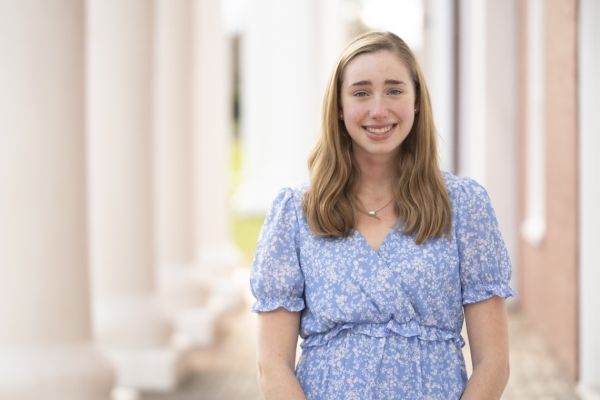Meet a W&L Scholar: Julia Brinker ’25 Brinker makes her mark on Florence, Italy’s digital history.
Editor’s note: This series will present a conversation with a current W&L scholarship recipient, summer intern or research scholar. W&L’s generous donors have made these funds possible to enhance the university’s learning community.
“I am truly grateful to everyone who supports the Summer Research Scholars Program at W&L. It allowed me to pursue my passions and discover new interests through my exposure to the digital humanities field.”
~Julia Brinker ’25
Hometown: Towson, Maryland
Summer Program: Summer Research Scholar for the Florence As It Was project led by Sidney Gause Childress Professor in the Arts George Bent
Major: Cognitive and Behavioral Science
Q: Tell me your W&L story — what first attracted you to the university?
My grandfather went to W&L, so it’s always been a school that I’ve had in the back of my mind. When I entered the college process, I had no idea what kind of university I wanted to attend. After considering a host of options, I found that I wanted a university like my high school: relatively small, close-knit, rooted in tradition and academically rigorous. When I was accepted it was a no-brainer: W&L was the place for me. I love it and have gleaned so much information about myself and my interests during my time here.
Q: What extracurricular activities are you involved in on campus?
I am a member of Chi Omega sorority, Reformed University Fellowship and the First Year Orientation Committee.
Q: What is your favorite course this fall?
My Environmental Microbiology course. So much of biology is learning about things you can’t see without a microscope. In this class, we get to work hands-on with the things we’re learning about, from viewing colonies of microbes on Petri dishes as we’re culturing them to seeing a clump of DNA in the bottom of a test tube.
Q: Describe your internship this past summer and how it has influenced you.
I worked on researching, supplementing, writing and editing essays for the Florence As It Was project, which aims to digitally reconstruct the city of Florence as it looked in the late 15th century using interactive mapping, high-tech scanning and different modeling techniques. I got to research prominent families from that time, the fascinating artwork they commissioned, and the stunning buildings that house such pieces. The majority of my work consisted of combining information from many different sources into one succinct body of text. Having this background has definitely helped my academic work this semester. I am better at looking at the bigger picture. Also, I’ve come to understand that art history extends far past the realm of academia. To truly understand just one piece of art, we must look at multiple lives, legacies, and traditions.
In my work, I ended up working with quite a bit of code. Pulling back the curtain on the website and seeing what it takes to make everything run smoothly impressed me. There was a big learning curve in terms of figuring out how to navigate all of these coding platforms I had never encountered before. That could be intimidating at times, but I’ve made great strides toward understanding it and feel a sense of accomplishment and pride when looking at a chunk of code now.
Q: How did your work impact the project?
Our fearless leader, Professor George Bent, is actually in Florence for the next few months collecting data for the project every day! He is taking scans of various buildings and chapels, which we are in the process of combining, modeling, and uploading to the website.
The essays I worked on this summer will serve as annotations for online models of buildings, such as chapels within the Basilica di Santa Croce and the Loggia del Bigallo. These blurbs of information strategically placed on the model give the reader some context.
While this project is history-based, to turn a blind eye to all of the technology involved in creating it would discredit countless hours of work. Getting to see the humanities and technology come together like this has given me a whole new appreciation for the word ‘interdisciplinary’ and the amazing work resulting from their intertwinement.
I am truly grateful to everyone who supports the Summer Research Scholars Program at W&L. It allowed me to pursue my passions and discover new interests through my exposure to the digital humanities field.


You must be logged in to post a comment.